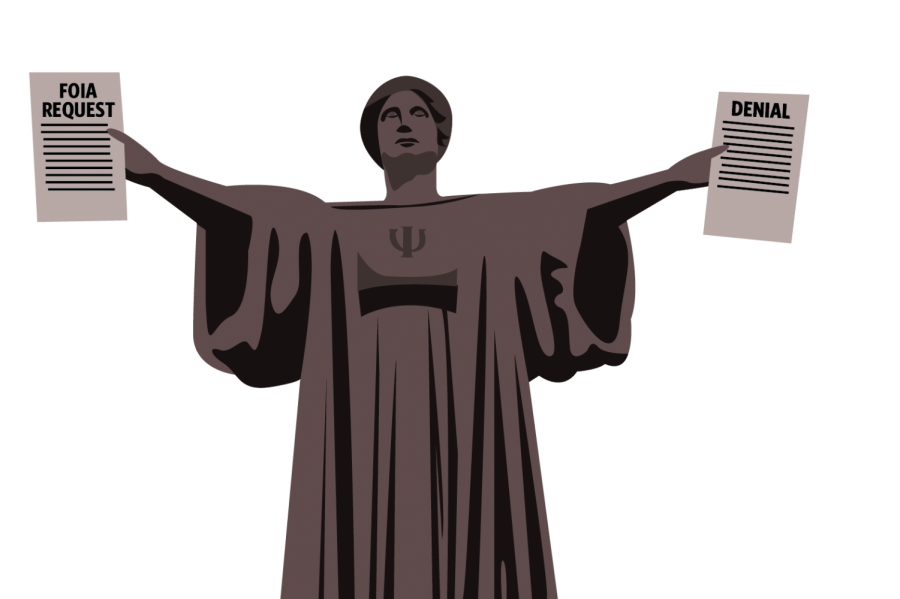Denial of information leads UI to potential lawsuit
Oct 10, 2019
After filing and being denied several requests for reports of sexual misconduct happening on campus, a graduate student turned to the Champaign County Circuit Court for further action.
On Sept. 23, John Bambenek, doctoral student in Informatics, filed a complaint with the circuit court claiming these documents, requested through the Illinois Freedom of Information Act, are public records and should be required to be disclosed.
Additionally, Bambenek claims in the drafted lawsuit these denials were made in bad faith and represent a pattern which prevents the public’s knowledge of information, specifically regarding matters of faculty-staff sexual misconduct related to the University.
“The University of Illinois has a reputation in the State of Illinois of basically denying all FOIAs because they can,” Bambenek said.
However, when a denial is received, the requester has the right to file an appeal with the Public Access Counselor, a part of the Attorney General’s office.
Get The Daily Illini in your inbox!
According to the PAC’s 2018 report, over 3,372 requests for review were submitted to the PAC.
A report from the Better Government Association, a nonpartisan watchdog group in Illinois, found the University of Illinois improperly applied exemption rules to FOIAs 63% of the time.
However, Bambenek did not decide to apply for a review with the PAC.
“You can go to the attorney general to file an appeal, but that can take a couple of years,” he said. “Or you can go directly to court and resolve it in a couple of months. So, I opted for the latter.”
In a written statement to The Daily Illini, University spokeswoman Robin Kaler said the University takes strong exceptions “to several inaccuracies” in Bambenek’s claim.
“The University is absolutely committed (to) transparency and accountability in every phase of our operations,” she said. “Our compliance with the Illinois Freedom of Information Act is an integral part of that transparency.”
Additionally, Kaler wrote the University has processed around 1,000 requests and provides more than 190,000 pages of responsive documents.
“We work diligently to respond to all requests in a timely and accurate manner that fully adheres to the rules and processes dictated by the law as administered by the Office of the Illinois Attorney General,” she said. “As is often the case, the University made numerous efforts to work with this requester to adjust the filings to make them less burdensome and more manageable.”
One FOIA request Bambenek filed was initially submitted on July 19 where he requested all final reports for any sexual harassment investigations, from Jan. 2014 to July 2019, in which a policy was found to be violated. The request was denied on July 25 for being “unduly burdensome.” Bambenek was invited to refile his request for “no longer than one-year durations for 2016 onward, and no longer than six-month durations for prior to 2016.”
However, he believes the request was not burdensome. In the filed lawsuit, Bambenek is named as an expert in digital forensics and computer crime investigation, and he has served as an expert witness regarding digital evidence.
“I teach a class on digital forensics,” he said. “I literally teach people how to find this stuff. It’s really not hard.”
Bambenek also claims in his lawsuit the “denial and unduly burdensome nature of searching for the documents is a thinly veiled manner in which their intent to deny the public visibility to the scope of the problem is in search of an exemption for which to justify the cover-up.”
This claim partially came from a ProPublica article in which it was found that seven University professors were facing harassment accusations but few consequences were given.
Kaler said in her written statement the University does not tolerate such behavior.
“Issues of sexual misconduct and sexual harassment threaten every aspect of our (University) missions, and they inflict personal and professional harm on members of our community,” she said. “We investigate and take appropriate action whenever conduct is reported that may jeopardize or impact the safety or security of our students or others.”
The current administration is working to revise the disciplinary processes so that quicker and more forceful action can be taken when employee misconduct is proven, Kaler wrote.
Going forward with the pending lawsuit, Bambenek said motions within the court will be filed. For example, the University’s lawyers may submit the obligatory motion for summary dismissal, which he does not think they will win.
“Then we’ll begin the process of discovery,” he said. “Where I could say, ‘This is the information I want, this who I want to depose.’ (The University) can file objections back and forth about what they’re going to give and what they’re not going to give me.”
He said the length of the entire process is unknown, but if Bambenek wins it could end in some settlement.
“I don’t know what they could offer me that would make up for the fact that I could start deposing University administrators under oath,” Bambenek said.
Thomas Hardy, chief records officer for the UI system, was unable to provide additional information given the pending litigation of the matter.






